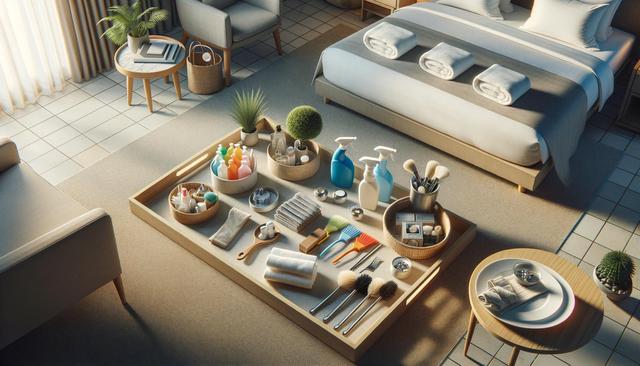Mastering Hotel Housekeeping: A Practical Guide to Effective Training and Operational Excellence
Curious about what it really takes to succeed in hotel housekeeping? This guide breaks down the essential training methods that help staff maintain high standards, boost efficiency, and create a welcoming stay for every guest.

Understanding the Foundations of House Keeping
Hotel housekeeping is more than just cleaning rooms; it is a critical part of the guest experience and overall hotel operations. A strong foundation in house keeping begins with understanding the core responsibilities, including room sanitation, linen management, and guest interaction. Training programs should start by emphasizing the importance of cleanliness, attention to detail, and time management. Staff must be equipped with not only technical skills but also a service-oriented mindset to meet the evolving expectations of guests.
Proper orientation includes guided walkthroughs of the workspace, explanations of cleaning procedures, and demonstrations of equipment usage. Role-playing scenarios can be especially beneficial, helping new hires understand how to handle guest requests or unexpected situations with professionalism. Investing in early, structured training sets the tone for long-term operational excellence and ensures consistency across shifts, including the crucial morning shift housekeeping team.
Implementing Effective Hospitality Housekeeping Training
Hospitality housekeeping training must be both practical and adaptable. It should address different learning styles and incorporate real-time feedback mechanisms. A well-rounded training plan often includes:
- Standard Operating Procedures (SOPs) for room cleaning and common areas
- Checklists for daily tasks and quality control
- Regular assessments and supervised practice sessions
Training should also be tailored to specific departments and shifts. For instance, morning shift housekeeping often involves room turnovers for incoming guests, requiring quicker yet thorough cleanings. Trainers should emphasize time management, prioritization, and guest interaction techniques during this shift. By focusing on operational workflows and guest expectations, housekeepers become more confident and efficient in their roles.
Leveraging Technology: AR in Housekeeping Training
The integration of augmented reality (AR) in housekeeping training is transforming how skills are taught and retained. AR allows trainees to engage in immersive simulations that replicate real-life situations without disrupting actual hotel operations. This approach is especially effective for visual learners and enhances understanding of spatial arrangements and cleaning protocols.
AR in housekeeping training can include modules such as:
- Virtual room cleaning exercises with step-by-step guidance
- Simulated emergency response scenarios
- Interactive tutorials on equipment handling and chemical safety
By using technology to supplement traditional training methods, hotels can improve engagement and retention rates among staff. Moreover, managers can track progress and identify areas for improvement, leading to more personalized development plans for employees.
Prioritizing Housekeeping Safety Protocols
Safety is a key aspect of any housekeeping operation. From handling cleaning chemicals to navigating slippery floors, housekeepers face a variety of risks on a daily basis. Implementing strong housekeeping safety protocols is essential to protect not only staff but also guests who interact with shared spaces.
Safety training should cover:
- Correct usage and storage of cleaning agents
- Ergonomic lifting techniques to prevent injury
- Fire safety and emergency evacuation procedures
- Personal protective equipment (PPE) guidelines
In addition, regular safety drills and refresher courses help reinforce these protocols over time. Encouraging a culture of safety also means empowering staff to report hazards and take proactive steps in preventing accidents. Managers should lead by example, ensuring compliance is part of the daily routine and not just a policy on paper.
Maintaining Standards Through Continuous Improvement
Once the initial training is complete, the focus should shift to performance monitoring and continuous improvement. Regular inspections, guest feedback, and peer evaluations contribute to maintaining high standards. Housekeeping supervisors should conduct routine checks and offer constructive feedback to encourage consistency and accountability.
Morning shift housekeeping teams, in particular, benefit from daily briefings that outline priorities, special requests, and occupancy updates. These meetings not only align the team but also provide an opportunity to address concerns and celebrate successes. Creating a feedback loop fosters a sense of ownership and pride among staff, which directly impacts guest satisfaction.
Incentive programs, cross-training opportunities, and ongoing workshops are additional ways to keep staff motivated and updated on new procedures and technologies. A dynamic approach to training and development ensures that hotel housekeeping remains responsive to changing industry demands and continually improves its service delivery.
Conclusion: Building Excellence in House Keeping
Achieving excellence in hotel housekeeping requires a strategic approach that combines thorough training, modern tools like AR in housekeeping training, and a strong focus on safety and quality. Whether it’s onboarding new staff or refining the skills of seasoned employees, consistent investment in hospitality housekeeping training pays off through improved efficiency, guest satisfaction, and staff morale. By embracing innovation and maintaining rigorous housekeeping safety protocols, hotels can ensure that every stay is clean, comfortable, and welcoming from check-in to check-out.